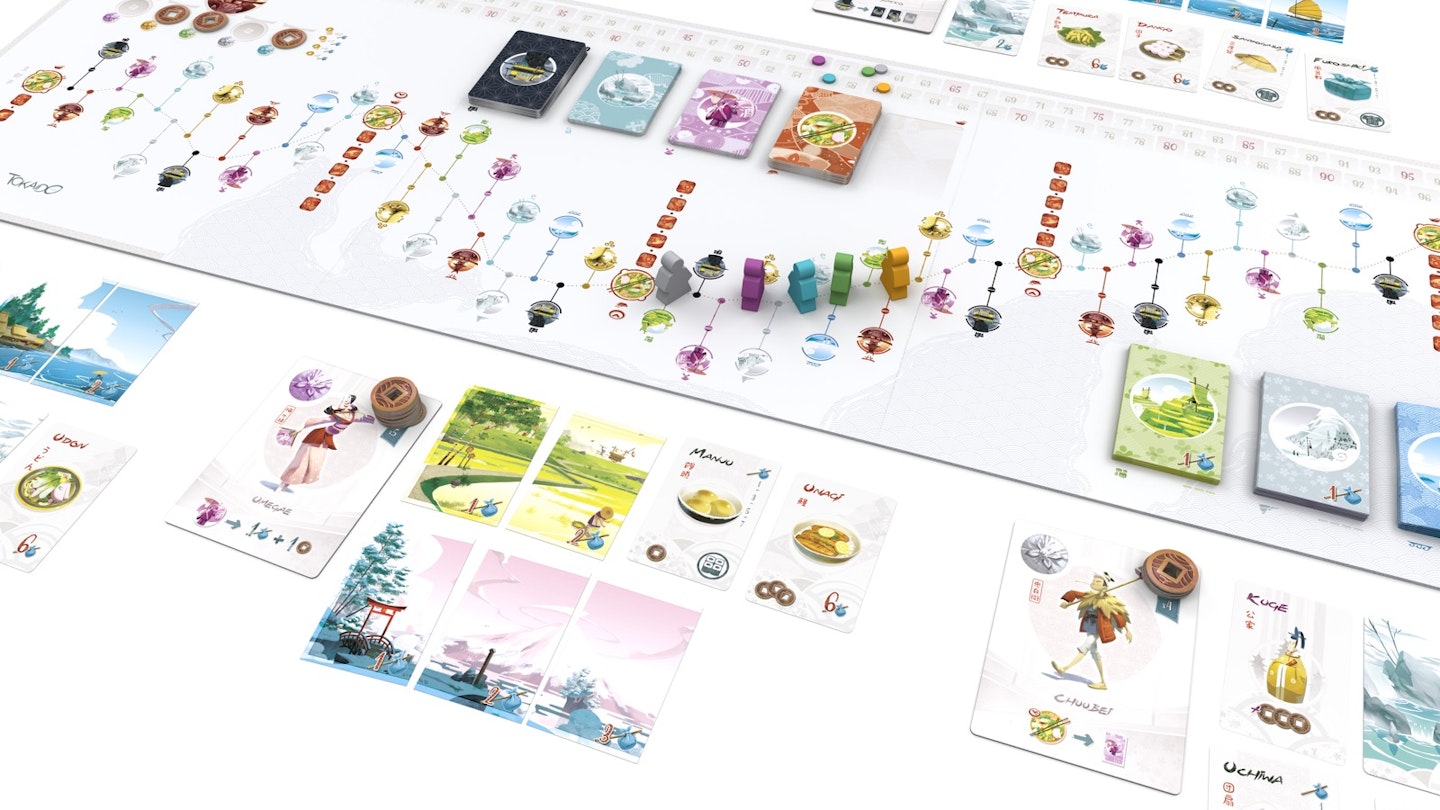You’ve got a copy of Risk or Sorry! collecting dust on a shelf. Or maybe last Christmas’ annual game of Monopoly led to tears and slammed doors. However, the board game industry is in the midst of a full-fledged golden age, featuring innovative gameplay systems, polished production values, and star designers.
Here are some of our favorite modern classics for travel enthusiasts – all are based on real places around the world. Each of these provides a level of depth you can’t find in a simple ‘roll-and-move’ game, but they aren’t overly complicated or intimidating for newcomers. They’re known as ‘gateway’ games, so step through one and explore.
Tokaido

The Tōkaidō road of Japan during the Edo period served as a seaside route connecting Kyoto and Edo (modern-day Tokyo). In this beautiful game, players take on the role of travelers on a quest for the most fulfilling journey. Your decisions revolve around seeing scenic landscapes, collecting souvenirs, meeting locals, enjoying hot springs, visiting temples, or relishing delicious meals.
The player furthest behind always has the next turn. You can move ahead strategically to avoid being blocked from certain activities, but beware – if you find yourself stuck, it may take time to get back on track. Despite its strategic elements, this game is meditative, featuring stunning watercolor-style artwork in a minimalist white aesthetic.
Designed by Antoine Bauza; 2-5 players; 45 minutes; Age: 8+;
Ticket to Ride

Having sold over 6 million copies, this modern classic is quickly becoming as popular as iconic games such as Battleship or Clue. In Ticket to Ride, players become railroad barons, laying down train tracks between cities to construct the most extensive and efficient network of stations. Collect sets of cards to claim routes – the longer the route, the more points you earn. Make sure to connect the cities indicated on your tickets before the game ends, or you’ll lose points instead of gaining them.
The original Ticket to Ride features a map of the United States. However, many expansions include new maps and unique gameplay strategies. From the Nordic Countries to the Heart of Africa, there’s a map to suit your interests. For enthusiasts, the stand-alone Ticket to Ride: Europe offers an excellent blend of gameplay and travel themes.
Designed by Alan R. Moon; 2-5 players; 30-60 minutes; Age: 8+;
Scotland Yard

Scotland Yard introduced the ‘one-against-many’ dynamic now common in modern board games. In this game, one player takes on the role of Mister X, a cunning criminal roaming the streets of London. Meanwhile, other players act as detectives, orchestrating a collaborative effort to corner Mister X. However, it is not as straightforward as it seems – Mister X stays hidden throughout the majority of the game, revealing himself only occasionally.
The game board depicts a map of London, featuring short taxi routes, longer bus routes, and extensive underground connections throughout the city. Detectives must communicate effectively, utilize logic, and manage transport tickets wisely to catch Mister X. This thrilling game offers high-stakes excitement for both the detective team and the elusive criminal, showcasing many of London’s iconic landmarks.
3-6 players; 45 minutes; Age: 10+;
Carcassonne

Carcassonne is a fortified city located in southern France, with a history dating back to the Gallo-Roman period. It has long served as a strategic point between the Atlantic and Mediterranean. In this award-winning game, players take turns placing tiles featuring roads, walled towns, fields, and cloisters. Each tile must match those on every side, and players can place their colored ‘meeple’ on tiles to score points when features are completed.
As the game progresses and the play area expands, the region’s interconnected roads and features grow increasingly impressive. Once you have mastered the base game, various expansions are available, introducing elements like rivers and markets.
Designed by Klaus-Jürgen Wrede; 2-5 players; 30-45 minutes; Age: 8+;
7 Wonders

The Pyramids of Giza, The Colossus of Rhodes, and The Lighthouse of Alexandria represent some of the ancient world’s true wonders. In 7 Wonders, you control a civilization and strategize how to develop your city. Will you invest in wonders and civic structures, prioritize scientific advancements, or engage in commerce and warfare with your neighbors?
At the start of each “age,” each player receives a hand of seven cards. Choose one card for your city and then pass the remaining cards to the next player. This process continues until all cards are played. After three ages, players score points based on the cities they have constructed and the strategies they have employed.
Designed by Antoine Bauza; 3-7 players; 30 minutes; Age: 10+;
Jamaica

If you’re eager to roll some dice, this beautifully illustrated pirate adventure is a strategic twist on the traditional roll-and-move concept. Compete around the island of Jamaica as one of several famous Caribbean pirates. Along your journey, you can seize treasure and engage in battles against opponents.
You’ll have limited holds for food, gunpowder, and those coveted doubloons on your ship, necessitating tough choices about what to keep and what to discard. Because in this game, it’s not solely about finishing the race first, but about hoarding the most gold by the end.
Designed by Malcolm Braff, Bruno Cathala, and Sébastien Pauchon; 2-6 players; 30-60 minutes; Age: 8+;




